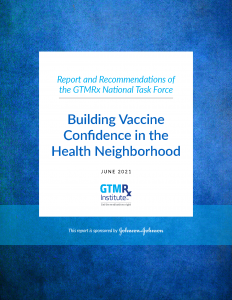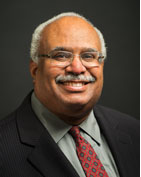 Today, the GTMRx National Task Force released an important new report: Report and Recommendations—Building Vaccine Confidence in the Health Neighborhood.
Today, the GTMRx National Task Force released an important new report: Report and Recommendations—Building Vaccine Confidence in the Health Neighborhood.Task Force calls for community action and changes to create grassroots organizations called Vaccine Confidence Leagues.
What GTMRx Task Force Leaders are saying:

Local leaders can address today’s vaccine concerns and help instill long-term confidence in the scientific discoveries that can help protect us in the future,” said Paul W. Abramowitz, Pharm.D., Sc.D. (Hon), FASHP, CEO of the American Society of Health-System Pharmacists and a co-chair of the Task Force. “These efforts are needed immediately to achieve COVID-19 vaccination goals, and in the future can also be leveraged for broader vaccination and community health efforts.”

“Lack of COVID-19 vaccine confidence is a serious barrier to public health efforts to protect the population. Without widespread vaccination, we are at increased risk that new, more deadly variants of the virus will develop over time,” said Georges C. Benjamin, MD, executive director of the American Public Health Association and co-chair of the Task Force. “To spare lives, it’s crucial that more people here and around the world become vaccinated. If there is one thing we have learned from this pandemic, it is the need for a stronger, better resourced public health system to adequately protect the public‘s health.”
 “A major strength of our report is that it calls for ‘bottom up’ efforts by communities, who are in the best position to understand who locally remains doubtful about the COVID-19 vaccines and why,” Susan Dentzer, senior policy fellow at the Robert J. Margolis Center for Health Policy at Duke University, said. “These communities can build on local efforts already under way to enhance vaccine confidence today and maintain and expand those efforts into the future—including this fall, when it is likely that vaccines will be authorized for use in children below age 12, and parents may also need to be reassured about the vaccines’ safety and efficacy.”
“A major strength of our report is that it calls for ‘bottom up’ efforts by communities, who are in the best position to understand who locally remains doubtful about the COVID-19 vaccines and why,” Susan Dentzer, senior policy fellow at the Robert J. Margolis Center for Health Policy at Duke University, said. “These communities can build on local efforts already under way to enhance vaccine confidence today and maintain and expand those efforts into the future—including this fall, when it is likely that vaccines will be authorized for use in children below age 12, and parents may also need to be reassured about the vaccines’ safety and efficacy.”
“These recommendations equip local leaders and liberate those at the community level who are willing and able to help by offering an overarching strategy they can adapt to meet community needs now,” Katherine H. Capps, GTMRx co-founder and executive director, said. “They complement national efforts, building a ground up approach that blends trust with time in order to effectively move those who haven’t been vaccinated yet and who trust their doctors, pharmacists, faith leaders and other community leaders to work in their best interest.”
In addition to development of Vaccine Confidence Leagues and community-building activities, the task force’s national-level recommendations include:
- Accelerated approval of vaccines
- Public education
- Payment reform
- Improve vaccine access for primary care practices
- More effective immunization information systems (IIS)
- No cost-sharing for certain patients
Other resources include:
- Frequently Asked Questions
- Full June 15 press release
- June 15 Building Vaccine Confidence Report
- March 2021 Background and Resources companion report
To mark the release, this week’s GTMRx news brief will feature articles related to the need for vaccine confidence.
“The fact is, we’re running out of people who have indicated that they want the vaccine as soon as possible,” according to analysis from CNN. “The issue is that we really haven’t seen the vaccination rate pick up since they [became] readily available in April. We’ve only seen declines pause,” according to the analysis. So what’s needed to move the needle? For the unvaccinated to have a sense of urgency about receiving their first dose. (CNN)
Britain had a successful COVID-19 response, but it’s now facing a rise in COVID cases. The uptick is largely attributable to the highly infectious virus variant known as Delta, which was first detected in India. Britain bears watching because the Delta variant now accounts for more than 6% of COVID infections in the US. Of particular concern is that this variant is not only more transmissible—it may lead to more severe disease. (New York Times; NPR)
Many states are cutting back on reporting pandemic data (cases, deaths, etc.), and epidemiologists and researchers are concerned. In particular, they worry this will leave public-health leaders with blind spots even as new variants emerge. Up-to-date vaccination data helps to identify and address problem areas and vaccine hesitancy in communities, Beth Blauer, executive director of the Centers for Civic Impact at Johns Hopkin, tells the Wall Street Journal. It also allows officials to make changes to reopening policies. (The Wall Street Journal)
Some of the 12,000 attendees at a June Bitcoin conference in Miami—the largest in-person meeting since the pandemic began—have tested positive for coronavirus, CNBC reports. The event had no mask or vaccination requirements. Meanwhile, in a much smaller event, two passengers on a Royal Caribbean cruise ship tested positive for COVID-19 this month. They are asymptomatic. (CNBC; NBC News)
At least 15 states have passed or are considering legislation that could endanger the public health, according to the National Association of County and City Health Officials. These bills would severely limit the legal authority of public health agencies. “It’s like telling a bunch of doctors, ‘We don’t like the fact that you take out appendixes, so we’re going to take away your authority to do surgeries,’” says Georges Benjamin, MD, executive director of the American Public Health Association. Benjamin also serves as a co-lead of the GTMRx National Task Force focused on building vaccine confidence in the health neighborhood. (MedPage Today; NACCHO report)
Note: sources that have an asterisk require login to view the article.
In Case You Missed It!
On June 8th, the GTMRx National Task Force- Building Vaccine Confidence in the Health Neighborhood had the following speakers:
- Bechara Choucair, MD, Vaccinations Coordinator, White House COVID Response Team, gave an overview of the White House efforts designed to build vaccine confidence in local communities to the Task Force
- Brian Castrucci, DrPH, MA, President & Chief Executive Officer, de Beaumont Foundation, presented on research related to COVID-19 vaccine concerns among a variety of individuals
This roundtable will be focused on payment, policy and practice reform to support optimized medication use. The event will be held on June 23, 2021 from 2 – 5 pm ET. Speakers to be announced soon.
Interested in sponsorship or attending? Contact Jeff Hanson (e: [email protected]).
AmazonSmile is an easy way for 0.5% of your qualified purchases go to the GTMRx Foundation at no cost to you. And signing up is simple—go to smile.amazon.com and select “Get the Medications Right Foundation” as your charity of choice. If you prefer to directly donate instead, you can do so here.
Adding the foundation on AmazonSmile will help us continue to provide no cost educational webinars, issue briefs, weekly news briefs and promote the need for transformation of our current system of medication use through social media campaigns.



